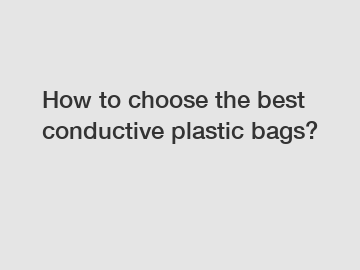How to choose the best conductive plastic bags?
When it comes to protecting electronic devices, components, and other sensitive equipment from electrostatic discharge (ESD), conductive plastic bags are an essential solution. These bags are designed to control static electricity and prevent damage to delicate items during transportation, storage, and handling. However, with a wide range of options available on the market, choosing the best conductive plastic bags can be a daunting task. In this article, we will discuss how to choose the best conductive plastic bags to meet your specific needs.
**Material Composition**.
The first factor to consider when choosing conductive plastic bags is the material composition. Conductive plastic bags are typically made of polyethylene with added carbon or metal additives to make them conductive. While carbon-filled bags are more cost-effective, metalized bags provide better electrostatic discharge protection. Consider the level of static control required for your application and choose a bag that meets your specific needs.

**Size and Thickness**.
The size and thickness of conductive plastic bags are important considerations when choosing the best option for your needs. Bags come in a variety of sizes, from small pouches to large shipping bags, so it's essential to choose a size that accommodates your items comfortably. Additionally, the thickness of the bag will impact its durability and level of protection. Thicker bags provide better resistance to tears and punctures, making them ideal for storing heavy or sharp objects.
**Closure Mechanism**.
Another important factor to consider when choosing conductive plastic bags is the closure mechanism. Bags can come with various closure options, including zip-top, adhesive strip, or heat-sealable closures. The closure mechanism should be secure and easy to use to ensure that your items are protected from static electricity and environmental contaminants. Consider the frequency of opening and closing the bags and choose a closure mechanism that meets your requirements.
**Surface Resistivity**.
Surface resistivity is a critical specification to consider when selecting conductive plastic bags. This measurement indicates how easily static electricity can flow across the surface of the bag. Lower surface resistivity values indicate better static control, making the bag more effective at preventing ESD damage. Look for bags with surface resistivity values within the recommended range for your application to ensure optimal protection.
**Compliance with Industry Standards**.
When choosing conductive plastic bags, it's essential to ensure that they comply with industry standards and regulations. Bags that meet international standards, such as ANSI/ESD S20.20 or IEC 61340-5-1, are designed to provide reliable static control in various environments. Additionally, bags that are RoHS compliant are free from hazardous substances, making them safe for use with sensitive electronic components.
In conclusion, choosing the best conductive plastic bags requires careful consideration of material composition, size and thickness, closure mechanism, surface resistivity, and compliance with industry standards. By selecting bags that meet your specific needs and requirements, you can protect your valuable electronic devices and components from electrostatic discharge damage. Contact us to learn more about our selection of high-quality conductive plastic bags and find the perfect solution for your static control needs.
Are you interested in learning more about Epe Tv Bag, Pe Vci Bag High Quality, Esd Antistatic Blister Tray? Contact us today to secure an expert consultation!
37
0
0

Comments
All Comments (0)